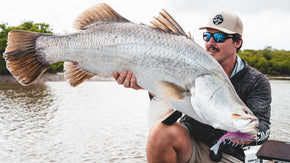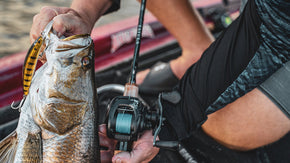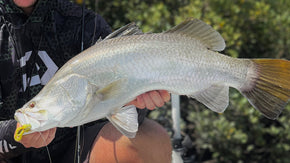Posted 11th September 2025
How to get started in fishing


By Robert Thornton
Working in a tackle shop, I get to meet lots of people at the very beginning of their fishing journey. Over time, I’ve realised that there is no one type of person who fishes, and in reality, people from all walks of life gravitate toward this pastime, albeit for a variety of reasons.
If you’re one of these newcomers, this article will provide you with a good foundation to get you started. It will also dispel some of the myths that can all too often dissuade beginners from venturing further. Let’s jump right in!

WHY FISHING?
This is an important question to ask yourself. While it might seem irrelevant, it’s actually really helpful for those starting out, as it provides a basis for some of the early decisions you’ll need to make. Decisions like what gear to buy, where to fish, and which species to learn about are easier to make if you know what you want from the sport.
Some people fish for food, some for the challenge, others simply use it as an excuse to get outside – I’m a mixture of all these things. Knowing why you want to become an angler will help you set yourself up adequately.
For example, someone solely interested in food gathering would be better off focusing on bait fishing techniques and buying tackle suited to that. On the other hand, a person looking for a new outdoor challenge might get more enjoyment directing their energy into learning lure and fly techniques. I personally enjoy employing a mixture of bait, lure and fly techniques, as over time I’ve come to enjoy many different aspects of fishing.
You may find yourself starting general and becoming more specific, or you may start specific and branch out to become more general. Whichever path you choose, it’s always good to have a basic idea of what you want from fishing at the start, as this is the foundation on which you’ll build your angling skills and knowledge.
THE RIGHT GEAR
Once you have an idea of what you want to catch and why, you’ll be able to start putting together an arsenal fit-for-purpose. This section will provide a few basic tackle suggestions for the beginner but isn’t a set of hard-and-fast-rules by any means.
If you’re just looking to get out of the house somewhere local, spend time with your kids or friends, and maybe even catch a fish or two for the table, the good news is that you don’t need much. If this is you, you only need a very basic kit to get started. Daiwa’s D-Shock 1BB Pre-Mounted Combo is ideal for soaking some baits down at the local dam, creek or estuary, and comes in at under $100. The rod is a composite construction of graphite and fibreglass, meaning it’s nice and flexible and allows biting fish some slack to get the bait into their mouth. With just a selection of small hooks, swivels and sinkers, a pair of pliers and some type of bait, you have everything you need to kill a few hours down by the water’s edge! For tips on setting up your bait fishing rod, click here.

If you’re interested in beach fishing, your initial purchases will be slightly different. Generally, beach fishing (with lures or bait) requires longer rods and a few extra bits and pieces to make it comfortable for the angler. For beach fishing basics and tips for beginners, click here. Fishing off the ocean rocks is not something I recommend for newbies, however you can check out my rock fishing guide for beginners here.
For lure fishing, things are a bit different again. Most novice lure anglers start by chasing inshore species with light gear, usually from the bank or a platform like a jetty or public walkway. The Aird XT 2500/702LFSis an excellent pre-mounted combo to start lure fishing with for a couple of reasons. Firstly, the rod is 7ft long, so whether bank, kayak or boat fishing, you’ll have enough length to clear most bankside obstacles and punch out a decent cast from the shore, but it’s so long that it becomes inconvenient when manoeuvring around in the boat or kayak. Secondly, the graphite construction of the rods means it’s relatively stiff and responsive, which is perfect for accurate casting and imparting action in the lure with the rod. Lure fishing is possible with a fibreglass or composite rod, but it certainly is a lot harder when the rod’s wobbling around like a noodle! For lure fishing, braided fishing line like J-Braid Grand is usually preferable, as it doesn’t have any stretch and is easier to cast with.
Soft plastics are awesome for beginners to lure fishing, and in my opinion are kind of like a halfway point between bait and traditional hardbodied lures. Plastics can be fished like other lures with various retrieves and actions imparted by the angler, or they can be cast out and fished static like a bait! Some anglers will even cast their soft plastics out in the boat or kayak and put the rod in the rod holder, allowing the wave action to generate some movement in the plastic. If I had to choose three soft plastics for a land-based beginner fishing along the edges of a lake or estuary, I’d pick a Bait Junkie 2.5” Grub, Risky Critter, and a Kikker Curly. These plastics would ideally be rigged on a Bait Junkie Finesse Jighead, Covert Finesse Wire Jighead and a weedless EWG hook respectively. Between them, these three designs will cover every part of the water column and will catch fish in just about any part of the country and abroad!
For a better rundown of soft plastic basics, check out my blogs on setting up a soft plastic outfit and using soft plastics in saltwater.
Accessories and storage options are another consideration for new anglers, and you can browse Daiwa’s range of tackle storage products here. Essentials for land-based anglers include something to carry tackle on your person, like a shoulder bag or backpack, as well as a selection of basic tools. Those in a boat or a kayak will tend to opt for larger storage cases like a boat bag or carry bag, with enough space to store a good range of tackle, tools and other accessories.

OTHER PREPARATIONS
Once you’ve got a bit of tackle to use, the next step is the logistical preparation. Deciding where and when to fish can be a daunting task for beginners, but my honest advice is to just pick somewhere nearby and get down there whenever you have a few hours to spare.
Fishing is all about learning, and while you can learn a lot by reading, watching and listening to advice from those more experienced, there really is nothing quite as good as spending time on the water and learning by trial-and-error. Everywhere is different, and the best times, tides and locations will depend on a variety of factors, and most of the time this is best determined by getting out and giving it a go! For more tips on learning about your local waterways, check out my blog on the best times to go fishing.
Learning should happen at all stages of fishing, and even fishless days can provide opportunities for learning. With that said, there are things that can make the learning process easier, and I’ve covered some of them in Ten tips for angling success and Ten angling mistakes to avoid.
Another important part of preparation is to make sure you’re aware of the rules and regulations where you’re fishing. If you’re unsure about things like fishing licences, no-go zones, local equipment requirements and so on, State Government websites have all this information and will clear up any confusion. Nothing ruins a fishing outing like a hefty fine for doing something you didn’t know was illegal!
Finally, always tell someone where you’re planning to go and when you’re expecting to be home. Fishing can expose us to a variety of dangers, and while unlikely, serious accidents can and do happen when on the water. Letting someone know your plans before a fishing session can be the difference between getting help quickly and being stranded on your own without reception.
ALL YOU CAN DO IS TRY
People go fishing for lots of different reasons, and while it’s good to know these reasons before you start, quite often it becomes clearer once you actually start fishing! If you’re interested in fishing but have never done it before, my advice is to just give it a go! It’s easier now than ever to get your hands on inexpensive tackle, basic info and preparation tips, with so many tackle stores around the country and good content platforms like this one.
Do yourself a favour and get down to your local tackle store, chat to the staff and get yourself kitted up. After that you can begin researching. Once you get going, you’ll find it really isn’t as complicated as many people say it is. So long as you keep an open mind, learn from those with experience, and don’t get discouraged by fishless days, your angling skills and knowledge will continue improving until you’re the one giving the tips!
Good luck!
















